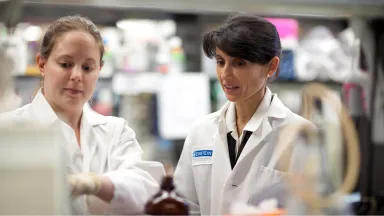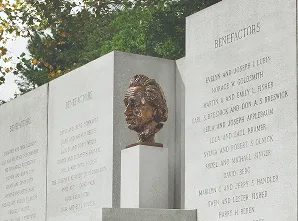
Lucas L. Sjulson, M.D., Ph.D.
- Associate Professor, Department of Psychiatry and Behavioral Sciences
- Associate Professor, Dominick P. Purpura Department of Neuroscience
Area of research
- Dr. Sjulson is a physician and neuroscientist who studies decision-making and drug addiction in rodent models using a broad approach that incorporates cutting edge methods from systems, computational, and molecular neuroscience.
Phone
Location
- Albert Einstein College of Medicine Rose F. Kennedy Center 1410 Pelham Parkway South 227 Bronx, NY 10461
Research Profiles
Professional Interests
Cortex-basal ganglia interactions in drug addiction and motivated behavior
Drug addiction and other neuropsychiatric conditions involve complex interactions between brain areas including the nucleus accumbens, hippocampus, and prefrontal cortex. Our previous work has characterized the role of interactions between hippocampus and nucleus accumbens in cocaine conditioned place preference, finding evidence that selective potentiation of specific hippocampal inputs to accumbens stores information linking certain spatial contexts to drug use. This provides a possible mechanistic substrate for the well-known phenomenon by which relapse is triggered by exposure to “people, places, and things” previously associated with drug use.
Our current work studies how interactions between hippocampus and accumbens influence prefrontal cortex as a basis for both physiological reward valuation and the pathological overvaluation of drugs of abuse. To this end, we combine carefully-designed mouse behavioral paradigms with a broad range of experimental techniques including multisite Neuropixels probe recordings, optotagging and closed-loop optogenetic manipulations, in vivo two photon and light field imaging, and in situ RNA sequencing. A major theme of this work is linking transcriptomically-defined cell classes to their functional roles during behavior. We also rely heavily on dimensionality reduction approaches, machine learning, and computational modeling to characterize and understand the population-level coordination of neuronal activity between brain regions during decision making and drug self-administration.
Developing novel translational strategies for treating drug addiction
Drug addiction represents a large public health burden for which few effective biologically-based treatments exist. We aim to develop novel gene-based tools and validate anatomical targets for future translational studies in human subjects. Our previous work in this area has focused on using DREADDs to modulate nucleus accumbens and suppress alcohol consumption in a model of binge drinking. We are currently expanding this work by exploring different brain targets and developing novel DREADD-like receptors with properties suitable for use in human subjects. We have also developed several novel molecular tools enabling manipulation of synaptic transmission and plasticity with greater precision than previously possible.
Highlighted awards
Dr. Sjulson was the recipient of a five-year, $2.5 million National Institutes of Health Director's Pioneer Award from the National Institute on Drug Abuse (NIDA).
Selected Publications
de Oliveira EF, Kim S, Qiu TS, Peyrache A, Batista-Brito R, Sjulson L (2022) Off-manifold coding in visual cortex revealed by sleep. bioRxiv:2022.06.10.495710.
Sjulson L, Peyrache A, Cumpelik A, Cassataro D, Buzsáki G. Cocaine place conditioning strengthens location-specific hippocampal coupling to the nucleus accumbens. Neuron. 2018 Jun 6;98(5):926-934.e5. doi: 10.1016/j.neuron.2018.04.015.
Sjulson L, Cassataro D, DasGupta S, Miesenböck G. Cell-specific targeting of genetically encoded tools for neuroscience. Annu Rev Genet. 2016 Oct 6.
Cassataro D, Sjulson L. The use of DREADDs (Designer Receptors Exclusively Activated by Designer Drugs) in transgenic mouse behavioral models. In Thiel, G (Ed.), Designer Receptors Exclusively Activated by Designer Drugs, Neuromethods Vol 108 (2015), Humana Press.
Cassataro D, Bergfeldt D, Malekian C, Van Snellenberg JX, Thanos PK, Fishell G, Sjulson L. Reverse pharmacogenetic modulation of the nucleus accumbens reduces ethanol consumption in a limited access paradigm. Neuropsychopharmacology. 2014 Jan;39(2):283-90.





